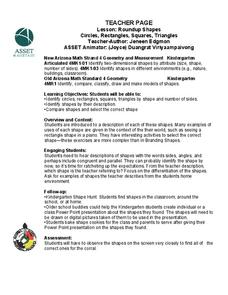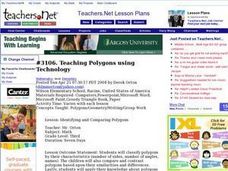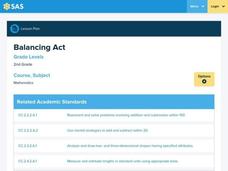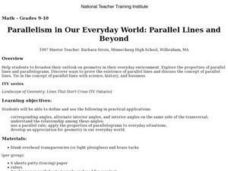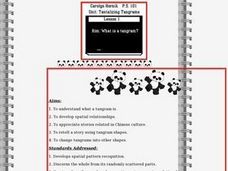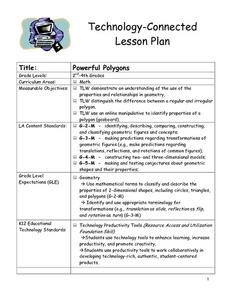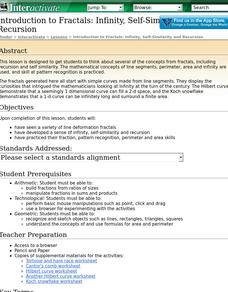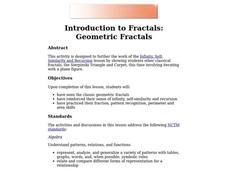Space Awareness
What is a Constellation
Why do some stars in a constellation appear brighter than others? Using a get-up-and-move astronomy activity, scholars explore perspective and the appearance of constellations in the sky while developing an understanding of the...
Outdoor Learning Center
Outdoor Survival
Which of the following can you survive without for the longest time: water, food, or a positive mental attitude? The answer may surprise you. Guide learners of all ages through games, activities, and discussions about surviving in the...
Ohio Department of Education
Describing and Creating Plane Figures - Grade One
Young mathematicians draw, create, and describe different shapes using triangles. They discuss attributes of the original and created shapes. Pupils classify the created shapes and draw and write in mathematics journals to communicate...
It's About Time
Life (and Fewer Deaths) After Seat Belts
Seat belts reduce serious crash-related injuries and deaths by about half. Scholars continue crashing their cart with a crash test dummy into a wall, but this time, they experiment with different types of seat belts to reduce injuries....
Curated OER
Exploring Trigonometric Ratios
Students identify the ratios of trig functions. In this trigonometry lesson, students construct triangles and use it to derive the values of sine, cosine and tangent. They use Cabri software to create the visual of the identities.
Curated OER
2-D Polygons
Students investigate the concept of two dimensional polygons. They complete a vocabulary chart with the teacher or in independently. Students are shown various polygons in order to classify them and then asked to draw one of them from...
Curated OER
Math is Everywhere: Part 2
Second graders identify shapes and measurements in everyday life. In this measurement lesson plan, 2nd graders locate rectangles in their classroom and use standard and nonstandard forms to measure them. Students view a video clip...
Alabama Learning Exchange
CELEBRATE!
Strengthen research skills by reviewing the months of the year and the holidays celebrated during those months. Learners draw and label a timeline for the months and label each holiday. They work in groups to research the holidays, and...
Curated OER
Roundup Shapes
Shapes are all around us! Kindergartenrs identify shapes in their world and guess the shape being described. They participate in a shape hunt.
Curated OER
Exploring Pythagorean Theorem
Eighth graders explore the Pythagorean Theorem. They use Geometer's Sketchpad and explore features of various figures. Students use the software to build a figure using the given measurements.
Curated OER
nvestigation - Justin and Daniel's Puzzles
Seventh graders explore area and perimeter, using tangram pieces. They discover the area and perimeter of rectangles and squares. After experimentation, 7th graders write a rule for finding the perimeter and area of squares and rectangles.
Curated OER
Tangrams
Students construct tangram pieces. Then they make observations and explore patterns with the pieces.
Curated OER
Making and Describing Shapes
Explore the concept of creating and describing 2D and 3D shapes. Using geometry your scholars will describe the attributes of shapes and their properties. They explore and discover what happens when you combine shapes and then take...
Curated OER
Teaching Polygons using Technology
Third graders utilize different types of computer programs, such as Microsoft paint and Microsoft Word to study and create different types of polygons. They use PowerPoint to create a story about a shape and others that it meets during a...
Curated OER
Balancing Act
Second graders identify the attributes of various shapes and estimate the weight of the objects. In this geometry lesson, 2nd graders identify the attributes of concrete objects and use a pan balance to weight them.
Curated OER
Usefulness of Irrigation
Students explore irrigation. In this science lesson plan, students show that water is necessary for plant growth and show how a dam can turn a nearly useless water way into a valuable form of irrigation.
Curated OER
Parallelism in Our Everyday World: Parallel Lines and Beyond
Students broaden their outlook on geometry in their everyday environment. They explore the properties of parallel lines and parallelograms and discover ways to prove the existence of parallel lines and discuss the concept of parallel lines.
Curated OER
Shaping Up with Nature at Black Bayou Lake
Students visit a local lake refuge and identify shapes they find in nature. They take pictures of the various shapes and use KidPix to draw shapes around the shapes in the pictures. They watch a slideshow of all the shapes found by their...
Curated OER
What is a Tangram?
Students identify a tangram. In this geometry lesson, students read Grandfather Tang's Story and retell each story using the tangrams on a flannel board. Students use tangrams to complete an included worksheet.
Curated OER
Classifying Polygons
Seventh graders participate in a polygon hunt. In this polygon lesson, 7th graders examine how polygons are alike and different. Students create a Venn diagram and label the sorting circles. Students work in cooperative groups to sort...
Curated OER
Powerful Polygons
Students scan the classroom to find different common shapes. They listen as the teacher defines polygon and regular polygon. The teacher demonstrates regular polygons via the Internet and the "Math is Fun" web site. Students go outside...
Curated OER
Introduction to Fractals: Infinity, Self-Similarity and Recursion.
This lesson introduces students to the ideas involved in understanding fractals. They develop a sense of infinity, self-similarity and recursion and
Curated OER
Introduction to Fractals: Geometric Fractals
Students study and observe the patterns made by the areas of the Sierpinski Triangle. Students use the computer to draw two or three iterations to discover the number patterns. Students complete worksheets based on Geometric Fractals.
Curated OER
Geometric Fractals and the Chaos Game
Young scholars define fractals and patterns. They explore how a seemingly random process can result in a pattern. Students practice probability and fractions skills by playing the chaos game online.










